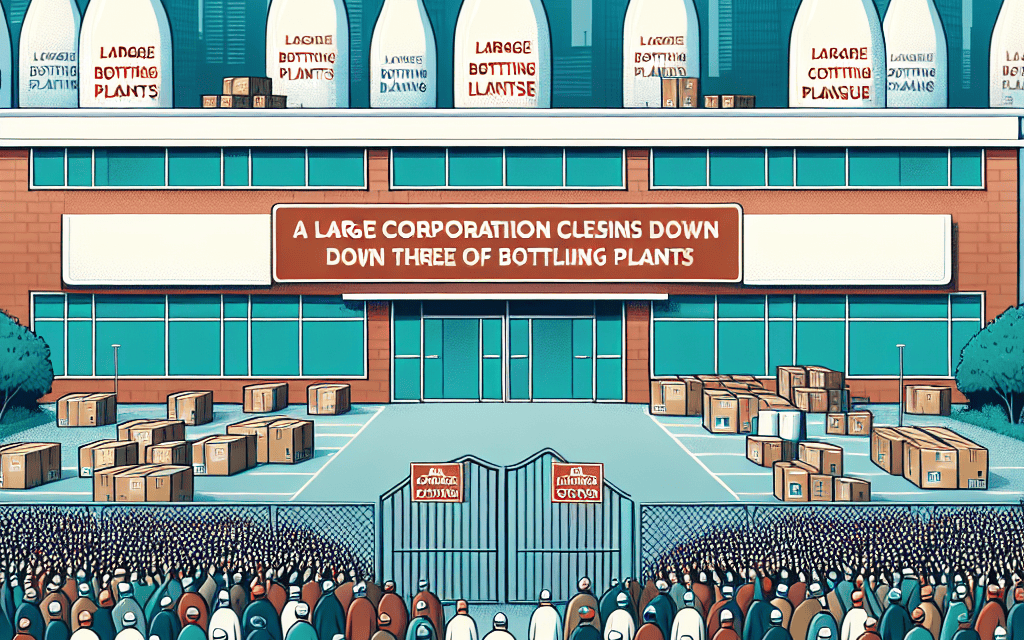“PepsiCo Restructures: Streamlining Operations Amidst Challenging Times”
Introduction
PepsiCo, a global leader in the food and beverage industry, has announced plans to close three of its bottling plants, a move that will result in significant workforce reductions. This strategic decision is part of the company’s ongoing efforts to streamline operations and enhance efficiency in a highly competitive market. The closures are expected to impact hundreds of employees, underscoring the challenges faced by large corporations in balancing operational costs with market demands. As PepsiCo navigates these changes, the company remains focused on optimizing its supply chain and maintaining its commitment to delivering quality products to consumers worldwide.
Impact Of PepsiCo’s Plant Closures On Local Economies
PepsiCo’s recent announcement to close three of its bottling plants has sent ripples through the local economies where these facilities are situated. The decision, which will result in hundreds of layoffs, underscores the broader challenges faced by communities heavily reliant on single industries or major employers. As these plants prepare to shut their doors, the immediate impact on the workforce is evident, with many employees facing the daunting prospect of unemployment. However, the ramifications extend beyond the individuals directly affected, influencing the economic fabric of the surrounding areas.
The closure of these plants is not an isolated event but rather a reflection of shifting dynamics within the beverage industry. As consumer preferences evolve and operational efficiencies become paramount, companies like PepsiCo are compelled to reassess their production strategies. While such decisions are often driven by the need to remain competitive in a rapidly changing market, they inevitably lead to significant consequences for local economies. The loss of jobs is the most visible outcome, but the ripple effects can be far-reaching, affecting local businesses, real estate markets, and municipal revenues.
Local businesses, particularly those that have thrived on the patronage of plant employees, are likely to experience a downturn. Restaurants, retail stores, and service providers that have catered to the workforce may see a decline in sales, leading to potential cutbacks or closures. This, in turn, can create a domino effect, further straining the local economy. Additionally, the real estate market may face challenges as demand for housing diminishes, potentially leading to a decrease in property values. This can affect homeowners and landlords alike, as well as impact local government revenues derived from property taxes.
Moreover, the reduction in municipal revenues can have a direct impact on public services. With fewer funds available, local governments may be forced to make difficult decisions regarding budget allocations, potentially affecting public infrastructure, education, and community programs. This can exacerbate the challenges faced by residents, particularly those who are already vulnerable or marginalized.
In response to these closures, community leaders and policymakers are tasked with finding solutions to mitigate the economic impact. Efforts to attract new businesses and industries to the affected areas are crucial in creating alternative employment opportunities. Economic diversification can help insulate communities from future shocks, reducing their dependence on a single employer or industry. Additionally, workforce retraining programs can equip displaced workers with the skills needed to transition into new roles, fostering resilience in the local labor market.
While the closure of PepsiCo’s bottling plants presents significant challenges, it also offers an opportunity for communities to reimagine their economic futures. By leveraging local strengths and fostering innovation, these areas can work towards building more sustainable and diversified economies. Collaboration between government entities, businesses, and community organizations will be essential in navigating this transition and ensuring that the affected regions emerge stronger and more resilient.
In conclusion, the impact of PepsiCo’s plant closures on local economies is multifaceted, affecting not only the immediate workforce but also the broader community. As these areas grapple with the consequences, proactive measures and strategic planning will be key to mitigating the negative effects and paving the way for future growth and stability. Through concerted efforts, communities can transform this challenge into an opportunity for renewal and revitalization.
Strategies For PepsiCo Employees Facing Layoffs
In light of PepsiCo’s recent announcement to close three of its bottling plants, resulting in hundreds of layoffs, employees are understandably facing a period of uncertainty and concern. Navigating such a transition can be challenging, but with strategic planning and proactive measures, affected employees can better position themselves for future opportunities. The first step in this process is to thoroughly understand the benefits and support systems that PepsiCo may offer during this transition. Companies often provide severance packages, career counseling, and job placement services to assist employees in their next career move. It is crucial for employees to take full advantage of these resources, as they can provide a valuable bridge to new employment.
Simultaneously, updating one’s resume and LinkedIn profile is an essential task. Highlighting skills, experiences, and accomplishments in a clear and concise manner can significantly enhance an individual’s appeal to potential employers. Moreover, employees should consider seeking feedback from colleagues or professional resume writers to ensure their application materials are polished and competitive. Networking also plays a pivotal role during this period. Engaging with former colleagues, attending industry events, and joining professional groups can open doors to new opportunities. By expanding their professional network, employees increase their chances of learning about job openings and gaining referrals, which can be instrumental in securing new positions.
In addition to these practical steps, it is important for employees to assess their career goals and consider whether this transition might be an opportunity to pursue a different path. This could involve exploring new industries, acquiring additional skills, or even considering entrepreneurship. Online courses, workshops, and certifications can provide the necessary training to pivot into a new field or enhance one’s qualifications in their current industry. Furthermore, maintaining a positive mindset is crucial during this time. While the prospect of job loss can be daunting, viewing it as an opportunity for growth and change can help mitigate stress and foster resilience. Engaging in activities that promote well-being, such as exercise, meditation, or hobbies, can also support mental health during this transition.
Financial planning is another critical aspect to consider. Employees should review their financial situation and create a budget that accounts for potential changes in income. Consulting with a financial advisor can provide guidance on managing expenses and planning for the future. Additionally, exploring unemployment benefits and other government assistance programs can offer temporary relief while searching for new employment. As employees navigate this transition, it is important to remain informed about industry trends and job market conditions. Staying updated on developments within the beverage industry and related sectors can provide insights into emerging opportunities and help employees tailor their job search strategies accordingly.
In conclusion, while the closure of PepsiCo’s bottling plants presents significant challenges for affected employees, a strategic and proactive approach can facilitate a smoother transition to new opportunities. By leveraging available resources, enhancing professional profiles, expanding networks, and maintaining a positive outlook, employees can effectively navigate this period of change. Ultimately, with careful planning and perseverance, this transition can serve as a stepping stone to new and rewarding career paths.
PepsiCo’s Decision-Making Process Behind Plant Closures
PepsiCo’s recent announcement to close three of its bottling plants has sent ripples through the industry, raising questions about the decision-making process that led to this significant move. The closures, which will result in hundreds of layoffs, are part of a broader strategy aimed at optimizing the company’s operations and ensuring long-term sustainability in a rapidly changing market. Understanding the rationale behind these closures requires a closer examination of the factors influencing PepsiCo’s strategic decisions.
To begin with, the beverage industry is undergoing a transformation driven by shifting consumer preferences and technological advancements. Consumers are increasingly gravitating towards healthier options, prompting companies like PepsiCo to diversify their product portfolios. This shift necessitates a reevaluation of existing production facilities to align with new market demands. Consequently, PepsiCo’s decision to close certain bottling plants can be seen as a response to the need for more efficient and flexible production capabilities that cater to evolving consumer tastes.
Moreover, the competitive landscape in the beverage sector is intensifying, with both established players and new entrants vying for market share. In this context, operational efficiency becomes paramount. By consolidating production and streamlining operations, PepsiCo aims to reduce costs and enhance its competitive edge. The closure of underperforming or redundant facilities is a strategic move to allocate resources more effectively and invest in areas with higher growth potential. This approach not only helps in maintaining profitability but also positions the company to better navigate future challenges.
In addition to market dynamics, technological advancements play a crucial role in shaping PepsiCo’s operational strategies. Automation and digitalization are transforming manufacturing processes, enabling companies to achieve higher levels of efficiency and precision. By closing older plants that may not be equipped to integrate these technologies, PepsiCo can focus on modernizing its remaining facilities. This transition allows the company to leverage cutting-edge technologies to improve production processes, reduce waste, and enhance product quality, ultimately benefiting both the company and its consumers.
Furthermore, PepsiCo’s decision-making process is influenced by its commitment to sustainability and environmental responsibility. The company has set ambitious goals to reduce its carbon footprint and promote sustainable practices across its operations. By closing plants that may not meet these sustainability standards, PepsiCo can concentrate on facilities that align with its environmental objectives. This strategic alignment not only supports the company’s sustainability goals but also resonates with consumers who prioritize environmentally conscious brands.
While the closures inevitably lead to job losses, PepsiCo has expressed its commitment to supporting affected employees through this transition. The company plans to offer severance packages, job placement assistance, and retraining programs to help ease the impact on its workforce. This approach reflects PepsiCo’s recognition of the importance of its employees and its responsibility to mitigate the adverse effects of such decisions.
In conclusion, PepsiCo’s decision to close three bottling plants is a multifaceted strategy driven by the need to adapt to changing consumer preferences, enhance operational efficiency, embrace technological advancements, and uphold sustainability commitments. While the immediate impact includes significant layoffs, the long-term vision is to position the company for sustained growth and competitiveness in an evolving market. As PepsiCo navigates this transition, its focus remains on balancing operational imperatives with its responsibilities to employees and the broader community.
The Future Of PepsiCo’s Bottling Operations

PepsiCo, a global leader in the food and beverage industry, has announced a strategic decision to close three of its bottling plants, a move that will result in the layoff of hundreds of employees. This decision is part of a broader effort to streamline operations and enhance efficiency within its bottling network. As the company navigates the complexities of a rapidly changing market, it is essential to understand the implications of this decision on its future bottling operations and the broader industry landscape.
The closure of these plants is not an isolated event but rather a component of PepsiCo’s ongoing strategy to optimize its supply chain. By consolidating operations, the company aims to reduce costs and improve its competitive position in the market. This decision reflects a growing trend among large corporations to focus on core competencies while outsourcing or closing less efficient operations. In doing so, PepsiCo hopes to allocate resources more effectively and invest in areas that promise higher returns.
While the immediate impact of these closures is the loss of jobs for hundreds of employees, PepsiCo has expressed its commitment to supporting affected workers. The company plans to offer severance packages and job placement assistance to help ease the transition for those impacted. This approach underscores PepsiCo’s recognition of the human element involved in such corporate decisions and its responsibility to mitigate the adverse effects on its workforce.
In addition to addressing the needs of displaced employees, PepsiCo is also focusing on the long-term sustainability of its bottling operations. The company is investing in advanced technologies and automation to enhance productivity and reduce environmental impact. By adopting more sustainable practices, PepsiCo aims to align its operations with global sustainability goals and meet the increasing consumer demand for environmentally responsible products.
Moreover, the closure of these plants presents an opportunity for PepsiCo to reevaluate its distribution network. By optimizing logistics and transportation, the company can ensure that its products reach consumers more efficiently. This realignment is crucial in an era where supply chain resilience and agility are paramount. As consumer preferences continue to evolve, PepsiCo’s ability to adapt its operations will be a key determinant of its success.
The decision to close these bottling plants also highlights the broader challenges facing the beverage industry. Companies are grappling with fluctuating raw material costs, changing consumer preferences, and increased regulatory scrutiny. In response, many are rethinking their operational strategies to remain competitive. PepsiCo’s move is indicative of a larger industry shift towards consolidation and innovation.
As PepsiCo embarks on this new chapter, it remains committed to maintaining its leadership position in the beverage market. The company is leveraging its strong brand portfolio and global reach to drive growth and innovation. By focusing on efficiency and sustainability, PepsiCo aims to create value for its shareholders while meeting the needs of its customers and communities.
In conclusion, the closure of three bottling plants marks a significant step in PepsiCo’s journey towards a more streamlined and sustainable operation. While the decision entails challenges, particularly for affected employees, it also presents opportunities for growth and innovation. As the company continues to adapt to the evolving market landscape, its strategic focus on efficiency and sustainability will be crucial in shaping the future of its bottling operations.
Community Response To PepsiCo’s Plant Shutdowns
The recent announcement by PepsiCo to close three of its bottling plants has sent ripples through the affected communities, sparking a range of responses from local leaders, employees, and residents. As the company moves forward with its decision, the impact on the local economies and the lives of hundreds of workers cannot be overstated. The closures, which are part of a broader strategy to streamline operations and cut costs, have been met with both understanding and concern from various stakeholders.
Initially, the news was met with shock and disappointment by employees who have dedicated years, and in some cases decades, to the company. Many workers expressed feelings of uncertainty about their future employment prospects, given the limited availability of similar jobs in their areas. The layoffs are expected to affect not only the workers but also their families and the broader community, as the economic ripple effects of such closures are far-reaching. Local businesses that rely on the patronage of PepsiCo employees are also bracing for a downturn in sales, which could lead to further economic challenges.
In response to the closures, local government officials have been vocal in their efforts to mitigate the impact on their communities. They have called for PepsiCo to provide comprehensive severance packages and job placement assistance to the affected workers. Additionally, there have been discussions about the possibility of retraining programs to help employees transition to new industries. These measures are seen as crucial steps in supporting the workforce during this difficult period.
Community leaders have also emphasized the importance of attracting new businesses to the areas affected by the plant closures. By fostering a more diverse economic landscape, they hope to create new job opportunities and reduce the community’s reliance on a single employer. This approach is seen as a long-term solution to prevent similar economic disruptions in the future. Moreover, there is a push for collaboration between local governments, business leaders, and educational institutions to develop strategies that will enhance the region’s economic resilience.
While the closures have undoubtedly posed significant challenges, they have also sparked a sense of solidarity among community members. Various support networks have emerged, with local organizations and volunteers stepping up to provide assistance to those in need. Food banks, financial counseling services, and job fairs are being organized to help affected families navigate this transition. This collective effort underscores the community’s resilience and determination to overcome the obstacles posed by the plant shutdowns.
On a broader scale, the closures have reignited discussions about the role of large corporations in local economies and the responsibilities they bear towards their employees and communities. Critics argue that companies like PepsiCo should prioritize sustainable business practices that consider the long-term well-being of their workers and the regions in which they operate. This perspective calls for a reevaluation of corporate strategies that prioritize cost-cutting measures at the expense of local livelihoods.
In conclusion, the closure of PepsiCo’s bottling plants has elicited a multifaceted response from the affected communities. While the immediate impact is challenging, the situation has also highlighted the importance of community resilience and the need for strategic planning to ensure economic stability. As the communities navigate this transition, the focus remains on supporting displaced workers and fostering a more diverse and sustainable economic future.
PepsiCo’s Role In The Beverage Industry Amid Plant Closures
PepsiCo, a global leader in the beverage and snack industry, has announced the closure of three of its bottling plants, a decision that will result in hundreds of layoffs. This move comes as part of the company’s broader strategy to streamline operations and enhance efficiency in an increasingly competitive market. As PepsiCo navigates these changes, it is essential to consider the company’s significant role in the beverage industry and the potential implications of these closures.
PepsiCo has long been a dominant force in the beverage sector, with a diverse portfolio that includes iconic brands such as Pepsi, Mountain Dew, and Gatorade. The company’s ability to innovate and adapt to changing consumer preferences has been a key factor in its sustained success. However, the beverage industry is currently facing numerous challenges, including shifting consumer tastes towards healthier options, increased competition from both established and emerging brands, and the ongoing impact of global supply chain disruptions.
In light of these challenges, PepsiCo’s decision to close three bottling plants can be seen as a strategic move to optimize its production capabilities. By consolidating operations, the company aims to reduce costs and improve efficiency, thereby maintaining its competitive edge. This decision, however, is not without its consequences. The closure of these plants will lead to the loss of hundreds of jobs, affecting not only the employees but also the communities in which these facilities are located.
The layoffs are a stark reminder of the broader economic pressures facing many industries today. As companies strive to remain profitable in a rapidly changing environment, workforce reductions have become an unfortunate reality. For PepsiCo, the challenge lies in balancing the need for operational efficiency with its commitment to social responsibility. The company has stated that it will provide support to affected employees, including severance packages and assistance with job placement. Nevertheless, the impact on local economies and the individuals involved cannot be overlooked.
Despite these challenges, PepsiCo remains a key player in the beverage industry, continually seeking ways to innovate and meet consumer demands. The company has been investing in new product lines that cater to health-conscious consumers, such as low-calorie and sugar-free beverages. Additionally, PepsiCo has been exploring sustainable practices, including the use of eco-friendly packaging and efforts to reduce its carbon footprint. These initiatives reflect the company’s recognition of the need to adapt to evolving market trends while maintaining its commitment to environmental stewardship.
As PepsiCo moves forward with its restructuring plans, the company will need to navigate the delicate balance between operational efficiency and social responsibility. The closures of the bottling plants, while necessary from a business perspective, highlight the complex challenges that large corporations face in today’s economic landscape. PepsiCo’s ability to successfully manage these changes will be crucial in maintaining its leadership position in the beverage industry.
In conclusion, PepsiCo’s decision to close three bottling plants underscores the ongoing challenges within the beverage sector and the broader economic environment. While the move aims to enhance operational efficiency, it also raises important questions about the impact on employees and local communities. As PepsiCo continues to innovate and adapt, its role in the beverage industry remains significant, with the potential to influence market trends and drive positive change.
Alternatives For PepsiCo’s Displaced Workforce
PepsiCo’s recent announcement to close three of its bottling plants has sent ripples through the communities that have long relied on these facilities for employment. As the company restructures its operations to enhance efficiency and adapt to changing market demands, the decision inevitably leads to the displacement of hundreds of workers. This development raises pressing questions about the future of these employees and the alternatives available to them in the wake of such significant job losses.
In the face of this challenging situation, it is crucial to explore viable alternatives for the displaced workforce. One potential avenue is the pursuit of retraining and upskilling programs. As industries evolve, the demand for new skills becomes increasingly apparent. By investing in education and training, former PepsiCo employees can transition into roles in emerging sectors. Local community colleges and vocational training centers often offer courses tailored to the needs of the current job market, providing a pathway for workers to acquire skills in areas such as information technology, healthcare, and renewable energy.
Moreover, partnerships between PepsiCo and local government agencies could facilitate the creation of job placement programs. These initiatives can help bridge the gap between displaced workers and potential employers, ensuring a smoother transition into new employment opportunities. By leveraging existing networks and resources, such programs can provide valuable support in job searching, resume building, and interview preparation, ultimately enhancing the employability of affected individuals.
In addition to retraining and job placement efforts, entrepreneurship presents another promising alternative for those impacted by the plant closures. With the right support and resources, displaced workers can explore the possibility of starting their own businesses. Small business development centers and local chambers of commerce can offer guidance on business planning, access to funding, and mentorship opportunities. By fostering an entrepreneurial spirit, former employees can transform their skills and experiences into successful ventures, contributing to the economic vitality of their communities.
Furthermore, it is essential to consider the role of social safety nets in supporting displaced workers during this transition period. Unemployment benefits, for instance, can provide temporary financial relief while individuals seek new employment or undergo retraining. Ensuring that these benefits are accessible and sufficient is critical in alleviating the immediate economic impact of job loss. Additionally, community support services, such as counseling and financial planning, can help individuals navigate the emotional and practical challenges associated with unemployment.
While the closure of PepsiCo’s bottling plants undoubtedly presents significant challenges, it also offers an opportunity to reimagine the future of work for those affected. By prioritizing retraining, job placement, entrepreneurship, and social support, stakeholders can work collaboratively to create a more resilient and adaptable workforce. This approach not only benefits the displaced employees but also strengthens the broader economy by fostering a culture of continuous learning and innovation.
In conclusion, the closure of these bottling plants serves as a reminder of the ever-changing nature of the job market and the importance of proactive measures to support displaced workers. By exploring and implementing a range of alternatives, PepsiCo, local governments, and community organizations can help ensure that affected individuals have the tools and resources they need to successfully navigate this transition and secure a brighter future.
Q&A
1. **What is PepsiCo planning to do?**
PepsiCo is planning to close three bottling plants.
2. **How many plants are being closed by PepsiCo?**
Three bottling plants are being closed.
3. **What will be the result of these closures?**
The closures will result in hundreds of layoffs.
4. **Why is PepsiCo closing these plants?**
The specific reasons for the closures are not provided, but such decisions are typically made for cost-cutting, efficiency improvements, or strategic realignment.
5. **How many employees are expected to be affected by the layoffs?**
Hundreds of employees are expected to be affected.
6. **Which company is responsible for these layoffs?**
PepsiCo is responsible for the layoffs.
7. **What industry does PepsiCo operate in?**
PepsiCo operates in the food and beverage industry.
Conclusion
PepsiCo’s decision to close three bottling plants, resulting in hundreds of layoffs, reflects a strategic shift in its operational model, likely aimed at optimizing efficiency and reducing costs. This move may be driven by changing market dynamics, technological advancements, or a need to consolidate operations to maintain competitive advantage. While it may improve the company’s financial health in the long term, the closures will have significant immediate impacts on the affected employees and local economies. PepsiCo will need to manage the transition carefully to mitigate negative perceptions and support those impacted by the layoffs.





